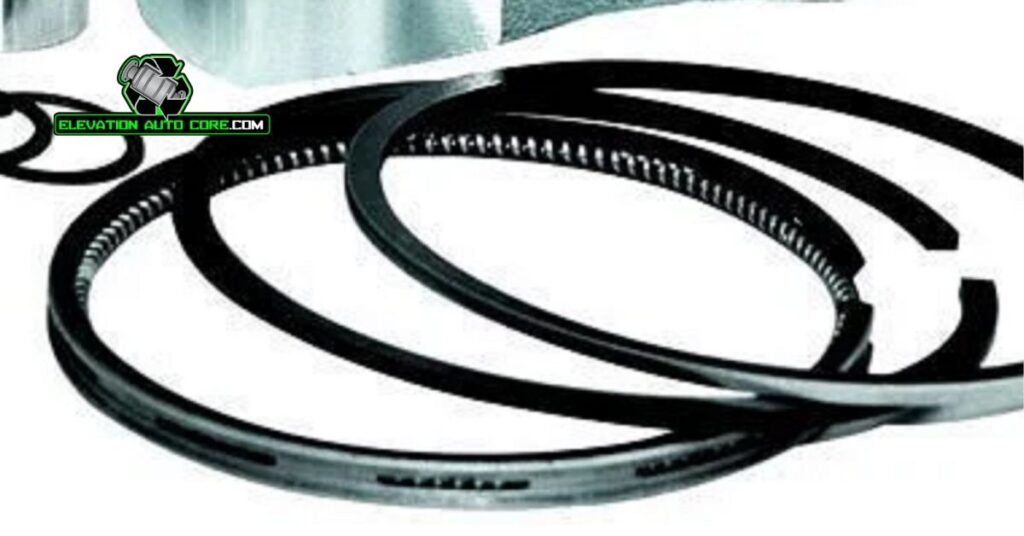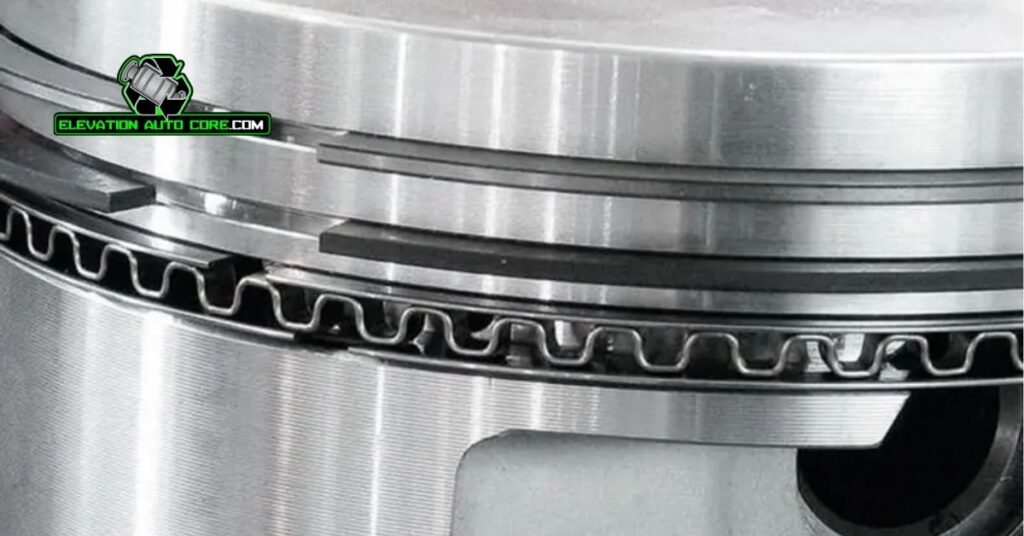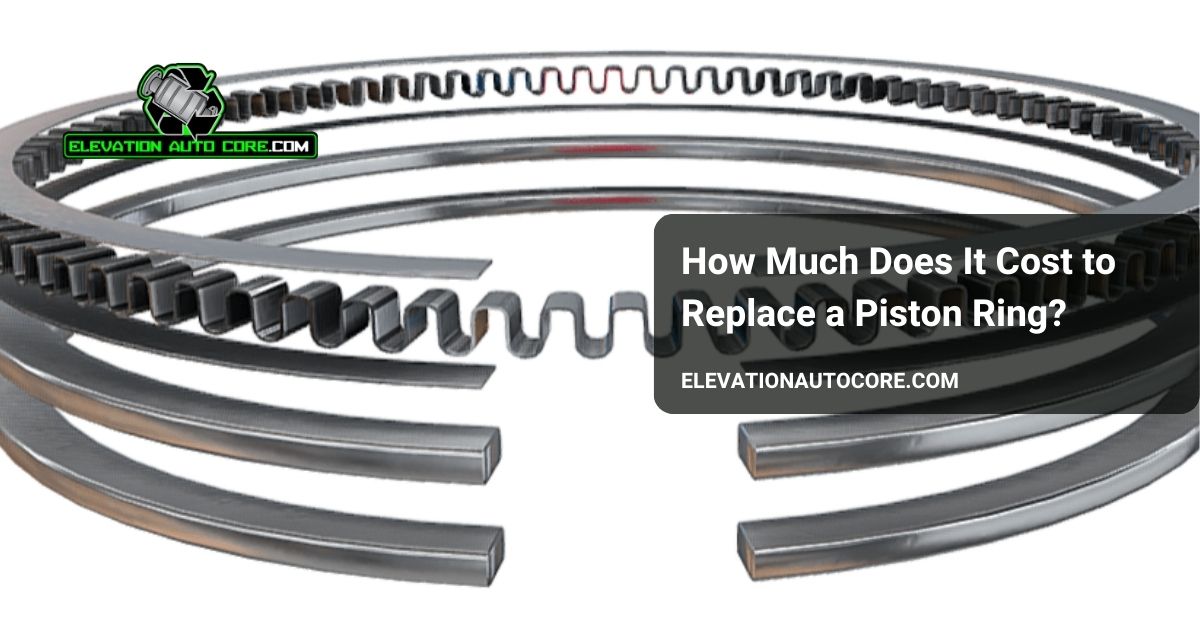How much does it cost to replace a piston ring? If your engine’s performance has dropped or you’re noticing excessive smoke, you might be facing this costly repair. Understanding the factors that influence piston ring replacement costs can save you time and money—keep reading to make an well-informed choice.
What Is A Piston Ring And Its Function?

A piston ring is a circular metal component fitted around the outer diameter of the piston inside an engine. It forms a seal between the piston and the cylinder wall. Designed to regulate engine performance, it ensures efficient combustion by maintaining proper pressure.
You’ll find that piston rings serve three key functions. They prevent combustion gases from escaping the combustion chamber. They also control oil consumption by scraping excess oil off the cylinder walls, returning it to the oil pan. Finally, they transfer heat from the piston to the cylinder wall to prevent overheating.
Modern engines typically use three rings on each piston. The top two rings are compression rings, which ensure the combustion process remains sealed. The third ring, often called the oil control ring, manages the lubrication of the cylinder walls. Efficient piston rings directly affect engine performance, emissions, and fuel economy.
Signs Your Piston Ring Might Need Replacement
Poor engine performance often indicates worn or damaged piston rings. A noticeable drop in power during acceleration reflects potential sealing issues between the piston and cylinder wall.
Excessive smoke from the exhaust suggests oil entering the combustion chamber due to faulty oil control rings. Blue smoke points to oil burning, while white or black smoke may indicate other underlying problems.
High oil consumption can occur if the piston rings fail to regulate oil effectively. If you find yourself frequently topping up oil, a worn oil control ring could be the cause.
Low compression is a clear sign of failing compression rings. Conducting a compression test may reveal whether the rings are unable to maintain proper combustion pressure.
Unusual engine noises like knocking or rattling often result from improper sealing by the rings, leading to increased wear within the engine. These sounds should prompt immediate inspection.
Detecting these issues early can prevent extensive engine damage and reduce repair costs.
Factors Affecting The Cost Of Replacing A Piston Ring

The cost of replacing piston rings depends on several factors. Key considerations include labor charges, replacement parts, vehicle specifications, and any additional repairs.
Labor Costs
Mechanics typically spend 10 to 20 hours replacing piston rings. This extensive labor translates into high service fees. Labor rates vary by region, with costs averaging $80 to $150 per hour. A shop in a metropolitan area may charge more than one in a rural location. Experienced mechanics or specialized services can also increase the final bill.
Parts And Material Costs
Piston ring sets generally range from $50 to $200, depending on quality. Higher-end or OEM (Original Equipment Manufacturer) parts cost more. Additional expenses may arise from related components like gaskets, seals, and lubricants. The total material cost often depends on your engine type and its configuration.
Vehicle Make And Model
Luxury or rare vehicles typically incur higher costs. Engines in premium or import models require exact piston rings or materials, leading to increased prices. Compact car repairs tend to be cheaper, while larger engines demand pricier parts and longer labor hours. Older vehicles might also involve costlier components if parts are less accessible.
Additional Repairs Or Services
Cylinder honing or engine block resurfacing might be necessary during piston ring replacement. These added procedures increase overall costs, with each potentially costing $200 to $600. If damaged pistons, valves, or connecting rods are discovered, extra repairs will further inflate the bill. Regular inspections can help identify such issues early.
Average Costs Of Replacing A Piston Ring

Replacing a piston ring can be expensive due to both labor and parts. Costs vary depending on whether a professional handles the job or if you opt for a DIY approach.
Costs By Mechanic Shops
Professional mechanics typically charge based on labor time and the cost of parts. Labor times range from 10 to 20 hours due to the complexity of the job. Mechanics may charge $80 to $150 per hour depending on their experience and location. Parts, including piston ring sets, typically cost between $50 and $200, with OEM components often priced higher. Additional expenses for necessary materials like gaskets and lubricants can increase these costs further. Combined, expect total labor and parts costs to range from $800 to $3,000 when performed by professionals.
Costs If Done DIY
A DIY approach reduces labor charges but still involves purchasing parts and tools. Piston ring sets generally cost $50 to $200. You might also need additional tools and supplies such as a torque wrench, honing equipment, and replacement gaskets, adding up to $100 to $300. DIY labor time might significantly exceed 20 hours for those inexperienced with engine repairs. If you’re skilled and have the tools, the DIY route could cost between $200 and $500.
Regional Price Variations
Geographical locations also influence labor and parts costs. Urban areas with higher living costs often charge the upper range of $150 per hour for labor, while rural regions may average closer to $80. Parts pricing remains relatively consistent, although local taxes and shipping fees can add to costs. Extra fees associated with specialty shops in certain regions might also impact the total replacement expense.
Is It Worth Replacing A Piston Ring?
Replacing a piston ring can resolve critical engine issues like reduced power and oil consumption. Engine performance benefits significantly when worn rings are replaced, as they ensure proper compression and efficient combustion. Without addressing faulty rings, recurring problems like excessive exhaust smoke and increased oil use can lead to further damage.
Costs range between $800 and $3,000 for professional work, which includes replacement and necessary inspections. For DIY repairs, expenses drop to $200 to $500, though the time and skill required are higher. Vehicles with rare or luxury parts might increase the overall cost, which makes evaluating your car’s value essential.
Neglecting replacement risks long-term engine damage, resulting in much higher repairs. Early intervention and regular inspections help maintain performance and save costs. If a vehicle has substantial mileage or other mechanical issues, replacing the entire engine or upgrading may be more practical. Always weigh repair costs against your car’s age and value before committing to piston ring replacement.
Tips To Save On Piston Ring Replacement Costs

Research local mechanics to compare labor rates and experience levels. Choosing a skilled yet reasonably priced mechanic can significantly reduce total expenses. Ensure the mechanic provides an accurate estimate, factoring in labor hours and part costs, to avoid unexpected charges.
Opt for aftermarket piston ring sets if your vehicle doesn’t require OEM parts. OEM components, while reliable, typically cost more than aftermarket alternatives. Verify that aftermarket parts meet the specifications of your vehicle to maintain performance.
Focus on preventative maintenance to avoid extensive repairs. Regularly check oil levels and engine performance to catch issues early. Addressing minor problems before they escalate can save you from costly repairs like cylinder honing or engine block resurfacing.
Consider purchasing parts yourself if the mechanic allows it. Local or online auto shops often offer discounts and promotions, lowering the price of necessary components. Ensure compatibility with your vehicle model before purchasing.
Use DIY repair options if you have mechanical knowledge. Completing this job on your own cuts labor costs, which range from $800 to $3,000 for professional services. Invest in quality tools and follow a detailed repair guide to achieve optimal results without causing further engine damage.
Search for trusted mechanics outside urban areas if higher city rates apply. Labor costs are often lower in rural regions, even for the same level of expertise. Factor in travel expenses when planning this approach to ensure the overall cost savings.
Conclusion
Understanding the costs and factors involved in replacing piston rings is essential for making informed decisions about your vehicle’s maintenance. By recognizing early warning signs and addressing issues promptly, you can avoid more extensive engine damage and costly repairs.
Whether you opt for professional help or a DIY approach, weighing the costs against your vehicle’s value and condition is key. Taking proactive steps like regular inspections and preventative maintenance can save you money and keep your engine running efficiently for years to come.

